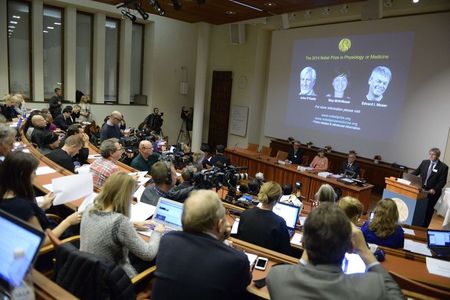By Mia Shanley and Kate Kelland
STOCKHOLM/LONDON (Reuters) - British-American John O'Keefe and Norwegians May-Britt and Edvard Moser won the 2014 Nobel Prize for medicine for discovering the brain's navigation system and giving clues as to how strokes and Alzheimer's disrupt it.
The Nobel Assembly, which awarded the prize of 8 million Swedish crowns ($1.1 million) at Sweden's Karolinska Institute on Monday, said the discovery solved a problem that had occupied philosophers and scientists for centuries:
"How does the brain create a map of the space surrounding us and how can we navigate our way through a complex environment?"
Ole Kiehn, a Nobel committee member and professor in Karolinska's neuroscience department, said the three scientists had found "an inner GPS that makes it possible to know where we are and find our way".
O'Keefe, now director at the centre in neural circuits and behaviour at University College London (UCL), discovered the first element of the positioning system in 1971 when he found that a type of nerve cell in a brain region called the hippocampus was always activated when a rat was in a certain place in a room.
Seeing that other nerve cells were activated when the rat was in other positions, O´Keefe concluded that these "place cells" formed a map of the room.
Uta Frith, a UCL professor of cognitive development said O'Keefe had shown "it is possible to literally map the mind".
"He has done much more than discovering neuronal mechanisms in the brain: he has discovered cognitive mechanisms that explain how human beings and other animals navigate," she said. "This beautiful work is heralding a new age of exploration of brain and mind."
In 1996, Edvard Moser and May-Britt Moser, who are married and now based in scientific institutes in the Norwegian town of Trondheim, worked with O'Keefe to learn how to record the activity of cells in the hippocampus.
Nearly a decade later, the Moser team discovered cells, in the entorhinal cortex region in brains of rats, which function as a navigation system. These so-called "grid cells", they discovered, are constantly working to create a map of the outside world and are responsible for animals' knowing where they are, where they have been, and where they are going.
Bill Harris, head of physiology, development and neuroscience at Britain's University of Cambridge, said the scientists' work "has not only revolutionised our understanding of this amazing puzzle (the brain), but has also opened the door into problems of place memory and how we learn and remember routes of navigation, and what sleep and dreams may be doing for memory and performance."
"STATE OF SHOCK"
While the findings help explain how the brain works, they have no immediate implications for new medicines or other therapies, since they do not set out a mechanism of action.
But knowledge about the brain's positioning system can also help understanding of what causes loss of spatial awareness in stroke patients or those with devastating brain diseases like dementia, of which Alzheimer's is the most common form and which affects 44 million people worldwide.
O'Keefe told reporters in London he was very surprised to get the Nobel Prize, particularly after what he described as a "chequered youth" jumping from studying classics at school, then aeronautics at college before getting into philosophy and psychology.
"I'm still in a state of shock," he said.
May-Britt Moser danced and drank champagne with her colleagues in Trondheim after she was told of the award.
"This is so great, this is crazy. I am just jumping, screaming," Moser told Reuters. "I am so proud of all the support that we have had. People have believed in us, in what we have been doing and now this is the reward."
Norwegian TV showed her co-workers singing "Happy Nobel to you" to the tune of "Happy Birthday".
Her husband did not immediately learn that he had won the Nobel Prize as he was on a plane bound to Munich. Someone was waiting for him at Munich airport with flowers and gave him the news, he told the Norwegian news agency NTB.
The Mosers join a small club of married couples to win a Nobel Prize that includes Pierre Curie and Marie Curie.
John Stein, an emeritus professor of physiology at Oxford said that, as with so many Nobel Prize winners, the scientists' discovery was at first ridiculed and dismissed, only later to get the recognition it warrants
"This is great news and well deserved," Stein said. "I remember how great was the scoffing in the early 1970s when John first described 'place cells'. 'Bound to be an artefact' and 'he clearly underestimates rats' sense of smell' were typical reactions. Now, like so many ideas that were at first highly controversial, people say: 'Well that's obvious'!"
Medicine is the first of the Nobel Prizes awarded each year. Prizes for achievements in science, literature and peace were

first awarded in 1901 in accordance with the will of dynamite inventor and businessman Alfred Nobel.
(Additional reporting by Ben Hirschler in London, Simon Johnson and Niklas Pollardin Stockholm, and Gwladys Fouche in Oslo. Editing by Alistair Scrutton and Angus MacSwan)
